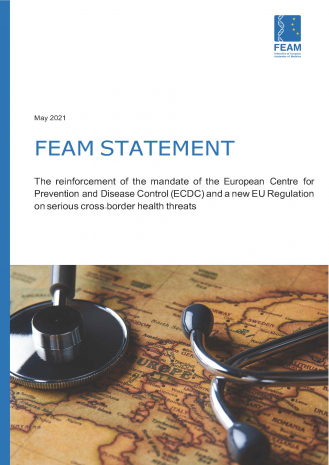In the statement The Reinforcement of the mandate of the European Centre for Prevention and Disease Control (ECDC) and a new EU Regulation on serious cross-border health threats, the Federation of European Academies of Medicine (FEAM) issued a list of recommendations aimed at strengthening the ECDC's mandate.
The ongoing COVID-19 crisis has shown the limitations as well as the potential for further EU cooperation in public health and health research. Uncoordinated measures from Member States have created significant problems and confusion among citizens.
As explained by Professor George Griffin, President of FEAM and Emeritus Professor of Infectious Diseases and Medicine at St George’s University of London, “communicable diseases do not respect borders – therefore a coordinated framework facilitating the fast and efficient cooperation of European countries is necessary”.
Limitations on both the EU and the ECDC’s powers and resources hindered efforts to handle the pandemic, and prevented a smooth and coordinated European response. With the support of its National Academies and their experts, FEAM developed recommendations on how to boost the role of the ECDC.
Professor Henrique Barros, President of the Institute of Public Health at the University of Porto and one the experts who contributed for the report, stressed that if the EU aims for the agency to fulfill its mission “it will need to guarantee that sufficient resources and clear competences are given to the ECDC”.
Despite restrictions on its powers and capacities, the ECDC continued to provide important information and relayed data and updates on the pandemic’s progress. However, a stronger ECDC with better resources would be capable of much more.
The COVID-19 crisis has also reminded of how easy it is for germs to pass from animals to humans. Therefore, a strong One Health programme, in which animal as well as human medical data are effectively shared and acted upon is crucial.
Although health remains a Member State responsibility, EU citizens seem to increasingly expect that the EU will play a more active role. Their voice should also be heard when planning new public health strategies.
“A stronger, well-resourced ECDC could provide a network to better facilitate knowledge exchange as well as improving surveillance and laboratory capacities in preparation for health crises”, concluded Professor Griffin.
FEAM Academies provided the following recommendations to the European Commission, Parliament and Council:
- Make sure expectations and mandates allocated to the ECDC as well as to other EU institutions and agencies are matched by sufficient resources and competences.
- Keep the focus of the ECDC on communicable diseases and cross-border health threats while following an integrated health vision that addresses health inequalities and pays due attention to the health needs of vulnerable populations.
- Provide further details on how the interoperability and cooperation between human health and veterinary sectors will be ensured and ensure closer alignment with other EU Agencies, such as the European Food Safety Authority (EFSA), the European Environment Agency (EEA), and the European Medicines Agency (EMA), in line with the One Health Approach and to respond to the need of increasing information exchange.
- Provide continuous monitoring and support for the ECDC and other agencies to ensure fast learning and adaptation to changing circumstances, including emerging health threats and technologies, also via an external committee composed of independent experts.
- Strengthen the role of the ECDC in facilitating the exchange of knowledge and providing training to support the development of surveillance, preparedness and laboratory capacities.
- Reinforce the role of the ECDC in the monitoring and surveillance of health threats, including by facilitating data sharing within the EU Health Data Space while addressing issues with sharing of health data for research with researchers ofpublic institutions outside of the EEA/EU.
- Facilitate synergies between the ECDC and other EU institutions and agencies, including the new EU agency EU Health Emergency Preparedness and Response Authority (HERA) as well as with other building pieces of the European Health Union such as the EU Health Data Space and the new Pharmaceutical Strategy for Europe.
- Clarify the involvement of external experts and of the ECDC in the proposed Advisory Committee on public health emergencies and facilitate the involvement of independent advisors on a continuous rather than on an ad-hoc basis.
- Foster the wider positioning of ECDC in the global network of agencies in continuing to build connections and sharing data with other lookalike agencies.
- Improve the design of the proposed EU Advisory Committee for health emergencies and ensure clear coordination with the WHO for the declaration of a health emergency at Union level to avoid clashes with the WHO and the global framework of the International Health Regulations.

